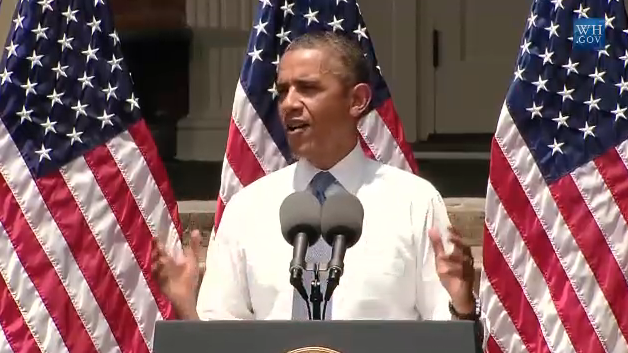President Obama announced a sweeping package of measures to address climate change today. But with a couple of exceptions, he was largely silent on the 27 percent of carbon emissions that come from the transportation sector.

One of the most important reforms the president announced is presidential memorandum he plans to issue to the EPA to develop carbon standards for power plants. Carbon emissions from these sources, unlike other harmful chemicals, have until this point gone unregulated by the federal government.
"Today about 40 percent of America’s carbon pollution comes from our power plants," said the president, speaking at Georgetown. "Right now there are no limits to the amount of carbon pollutions those plants can dump into the air. None."
"We've got to fix that," he said.
Obama's Climate Action Plan establishes a goal of doubling the amount of energy derived from renewable sources by 2020. The plan would also establish efficiency standards for appliances and federal buildings.
The most substantive portion of the plan related to transportation was the announcement that the president wants to expand new fuel efficiency standards for trucks and heavy vehicles beyond 2018. Those standards, the White House says, are projected to save about 270 million metric tons of carbon and 530 million barrels of oil.
The plan also calls for the elimination of "fossil fuel subsidies" in 2014, which would require Congressional cooperation. Research by the International Energy Agency has shown that eliminating those subsidies alone would reduce carbon emissions 10 percent by 2050, according to the Climate Action Plan.
In his speech, President Obama also made reference to the Keystone Pipeline, saying the State Department has been instructed not to approve the project if government analyses determine it would increase carbon emissions.
Jesse Prentice-Dunn, a policy analyst with the Sierra Club, says the Climate Action Plan is mostly a collection of policy fixes the president can enact without Congressional support -- such as new emissions standards -- which might explain why transportation got short shrift.
"A lot of the smart growth activities that are really going to transform our communities, we’re going to need money and support from Congress, and we certainly haven’t seen much action from them," Prentice-Dunn said.
But there is still plenty in this plan to get excited about, he said.
"Trucks are one of the fastest growing sources of oil consumption, one of the fastest growing sources of carbon pollution," said Prentice-Dunn. "We have the technology today to double the efficiency of our 18 wheelers. So this proposal will help meet that standard."
Also included in the Climate Action Plan was a series of programs to help communities deal with the consequences of climate change, to mitigate the effects of flooding and wildfires and droughts. One of the president's proposals calls for a $200 million fund to help secure transportation infrastructure against storm and flooding damage. In his speech today, President Obama announced that all federally funded projects going forward will be built to withstand increased flooding risk.
"What we’ve learned from Hurricane Sandy is that we’ve got to build stronger more resilient infrastructure," he said.





